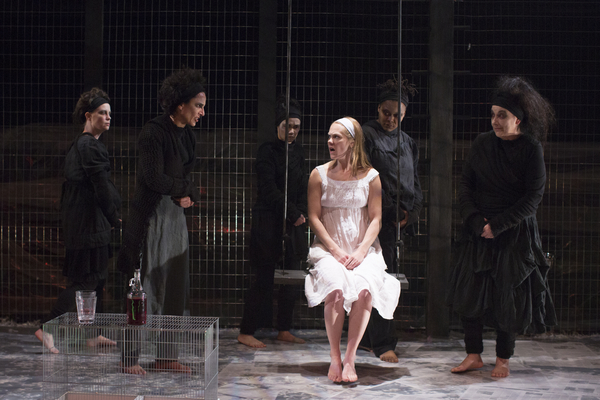It always disturbs me when I hear one of my female peers say something to the tune of, “Don’t worry—I’m not a feminist or anything,” as if it’s something to be embarrassed or even worried about. Thankfully, Imago Theatre’s production of If We Were Birds screams feminism, highlighting the strength of women and decrying the devastating topic of sexual violence against them—and that’s why it sat just right with me.
If We Were Birds, written by Erin Shields and directed by Micheline Chevrier, follows the tragic Greek myth of sisters Philomela (Amelia Sargisson) and Procne (Lauryn Allman).
The production features a mostly all-female cast—only two of the nine characters are played by men. As a result, it takes on a distinctly female point of view, with the audience being privy to intimate moments between the close sisters and experiencing all the action from their perspective.
In this incarnation of the tale, Procne is married off by her father Pandion, the King of Athens, to Tereus, the King of Thrace. Eventually, Philomela is sexually assaulted by Tereus, after which he cuts out her tongue and locks her in a cabin to prevent her from vocalizing the injustice done to her.
The sexual assault scene is handled sensitively, but it also highlights the rage and shame felt by Philomela after such a brutal invasion. Interwoven within her story are the narratives of the chorus (Deena Aziz, Stefanie Buxton, Shiong-En Chan, Clare Schapiro, and Warona Setchwaelo), who present their own accounts of sexual violence suffered at the hands of men, particularly during times of war.
The monologues given by each of these women are extremely powerful, leaving the room seemingly devoid of air; the collective grief felt for them is palpable. But they are also strong; Birds presents these women as survivors who rise above what happened to them. The proliferation of avian imagery in the play supports this notion.
Sargisson’s performance is breathtaking at many points in the production; she deftly maneuvers her character’s transition from an innocent young girl to a violated, knowing woman.
Set and costume designer Diana Uribe distinguishes between those who are naïve and those who have been violated with white and black colours: for the majority of the play Philomela and Procne are clothed in white, while the chorus, and Tereus, are dressed in all black. Interestingly, Pandion is clothed in a dark grey colour, presenting a literal ‘grey area’ between the two extremes—an attribute that is mirrored in his character.
Although this might seem like a rather obvious visual choice, the white costumes allow for a breath of fresh air from the mostly dark and foreboding set, replete with a ladder, a chain fence, birdcages, and an ominous platform above the stage.
The play clips along at an adequately quick pace, clocking in at just under an hour and a half. However, the brevity of the performance does not mar its worth—instead, it keeps the production from being bogged down by unnecessary distractions.
If We Were Birds uses Greek myth to explore a subject which is still, unfortunately, extremely prevalent in today’s society. There is a sense of anger and desperation in this production, one that calls for more care to the injustices suffered by women in war-torn countries—as well as those closer to home.
However, where Birds excels the most is in its insistence in portraying female victims of sexual violence as survivors; here, feminism prevails in the refusal to stay silent, instead drawing attention to something that is far more frequent than is often reported, and far more damaging than can be imagined.
If We Were Birds is playing at Centaur Theatre (543 St-François Xavier in Old Montreal) until Oct. 19. Student tickets are $18. Box Office: 514-288-3161 or online: http://www.centaurtheatre.com/tickets.php The Oct. 19 matinee is pay-what-you-can (suggested donation is $10)
Continuing their mandate to encourage dialogue, Imago Theatre will hold a talkback after each performance.










great!